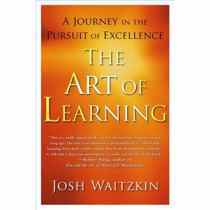Art Of Learning, The
A Journey In The Pursuit Of Excellence
Josh Waitzkin

Chess players will remember Josh Waitzkin as the subject of the hit movie, Searching For Bobby Fischer. But few know that Josh eventually stepped away from chess (he had earned an International Master title) for the equally frenetic but far more physical discipline of Tai Chi Chuan, where he ultimately won a World Championship. To quote Josh, “Ive come to realize that what I am best at is not Tai Chi, and it is not chess. What I am best at is the art of learning
Waitzkins The Art Of Learning is a autobiography that takes us to all corners of the globe as Josh learns about life, love, adventure and the need to look deep within himself for meaning that goes far beyond results and fame.
Decades ago I surprised an interviewer by saying that one of the hardest things a professional must learn is not how to deal with losing, but how to deal with victory. Of course, a chess pro must learn how to stay focused and calm after a loss. This is obvious. But the real trick is to retain a balanced sense of self after victory, fame, and success becomes the rule rather than the exception. Naturally, the recognition that ego and hubris is a trap thats waiting to snap shut on any successful artist and/or competitor can be verified by the out of control self-loving bodies that line Hollywood and the sports world. And while some measure of ego by itself is unavoidable, worshipping at your own alter isnt.
Josh, born to a well to do family and given an enormous amount of attention as a child due to his chess talent and the aforementioned movie, could easily have become another victim of his own success. Instead, he devoured the works of Hemingway, Hesse, Camus, and Kerouac (No Miller or Bukowski?) and began a lifelong self-analysis of his failures, triumphs, and experiences.
Most of the book features solid writing and excellent storytelling skills, but at times he gives us prose that hums with energy: “Forty seconds before round two, and Im lying on my back trying to breathe. Pain all through me. Deep breath. Let it go. I wont be able to lift my shoulder tomorrow; it wont heal for over a year, but now it pulses, alive, and I feel the air vibrating around me, the stadium shaking with chants, in Mandarin, not for me. My teammates are kneeling above me, looking worried. They rub my arms, my shoulders, my legs. The bell rings. I hear my dads voice in the stands, C’mon Josh! Gotta get up. I watch my opponent run to the center of the ring. He screams, pounds his chest. The fans explode. They call him Buffalo. Bigger than me, stronger, quick as a cat. But I can take him if I make it to the middle of the ring without falling over. I have to dig deep, bring it up from somewhere right now. Our wrists touch, the bell rings, and he hits me like a Mack truck.
Josh also has a lot to say about chess (the first 94 pages mostly concern chess, and then other interests begin to take center stage), and he isnt afraid to let it all hang out and share views and impressions that others might have kept to themselves. Discussing the legendary chess trainer, Dvoretsky: “In life, Dvoretsky is a tall, heavyset man who wears thick glasses and rarely showers or changes his clothes. He is socially awkward and when not talking about or playing chess, he seems like a big fish flopping on sand.
“At meals, he would mumble while dropping food on the floor, and in conversation thick saliva collected at the corners of his mouth and often shot out like streams of glue. If you have read Nabokov’s wonderful book The Defense, about the eccentric chess genius Luzhin well, that is Dvoretsky.
If you enjoy a good autobiography, youll like this book. More importantly, if the idea that both victory and defeat are equally important parts of ultimate success resonates with you, then this book will prove enjoyable, highly motivating, and perhaps even inspirational.
